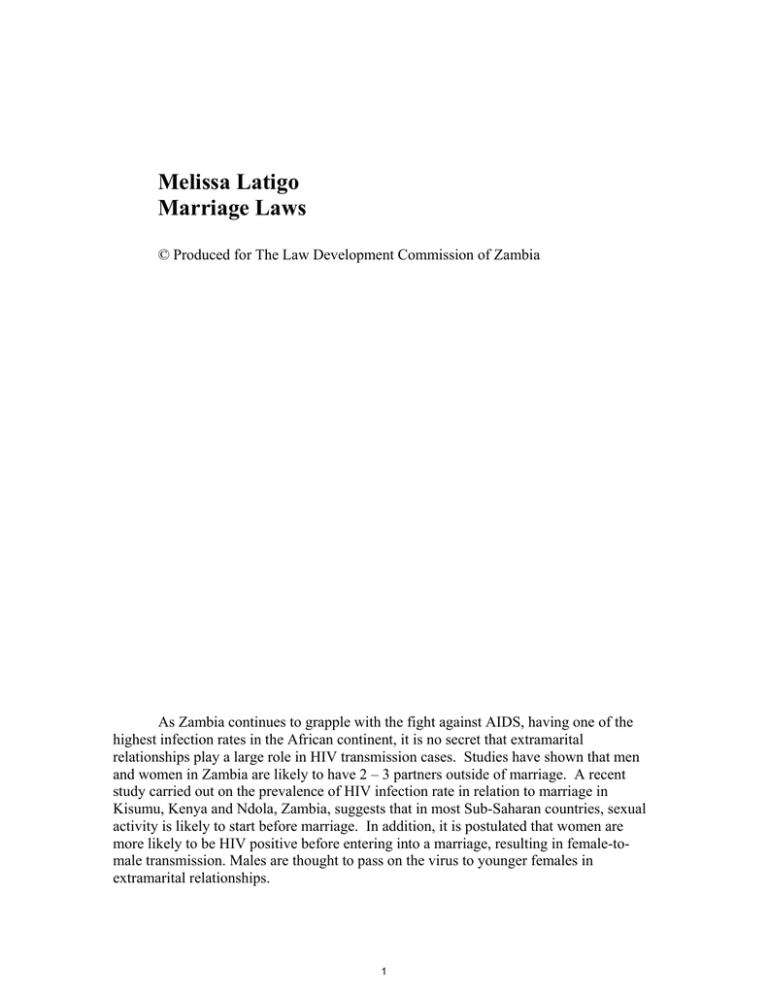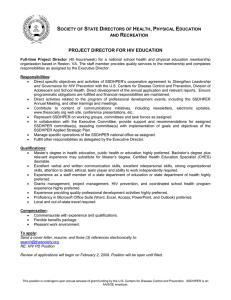
Melissa Latigo
Marriage Laws
© Produced for The Law Development Commission of Zambia
As Zambia continues to grapple with the fight against AIDS, having one of the
highest infection rates in the African continent, it is no secret that extramarital
relationships play a large role in HIV transmission cases. Studies have shown that men
and women in Zambia are likely to have 2 – 3 partners outside of marriage. A recent
study carried out on the prevalence of HIV infection rate in relation to marriage in
Kisumu, Kenya and Ndola, Zambia, suggests that in most Sub-Saharan countries, sexual
activity is likely to start before marriage. In addition, it is postulated that women are
more likely to be HIV positive before entering into a marriage, resulting in female-tomale transmission. Males are thought to pass on the virus to younger females in
extramarital relationships.
1
Though infidelity has meant a high price to pay for the country of Zambia in
controlling the spread of HIV, other factors must also be considered. Early marriage is
common in Zambia as it is in other African countries. Girls tend to marry at an early age
and hence are more likely to engage in frequent sexual intercourse. Married couples
often see less need for condom use, which clearly puts partners at risk from contraction of
HIV. It has been stated that “husbands of married girls are about three times likely to be
HIV positive than boyfriends of single girls.” Lastly, traditional marriage practices also
put a strain on hampering the spread of HIV. Sexual cleansing or kusalazya, is still
practiced among some Zambian tribes and involves widows undergoing sexual
intercourse with in-laws in order to be cleansed. “The traditional practice of "dry sex" -intercourse that involves male penetration of a tight, dry vagina -- causes internal
abrasions, thereby facilitating the transmission of HIV.”
These are some of the facts that should be considered when enforcing HIV/AIDS
marriage policies. It is now clear that to prevent the country fighting a losing battle
against the virus, stringent policies should be put in place that will enable Zambia to
mitigate what is already a socioeconomic crisis by developing laws for the different
sectors of the society. One of these sectors is marriage.
Marriage laws within the context of HIV normally focus on two popular issues:
1) Pre-nuptial Testing
On a global scale there has been continual debate as to whether countries should
establish mandatory testing laws prior to marriage in order to curb the effects of
HIV. Mandatory testing would prevent release of a marriage license to a couple
in the event that one of the partners is found HIV positive. The advantages to this
law may include a reduction in mother-to-child-transmission, as HIV positive
women are more likely to avoid pregnancy. Secondly, partner notification
(discussed below) prevents transmission to a potential spouse. However, after the
state of Illinois launched a relatively unsuccessful pre-testing law, it is evident
that such a law may not work at all in Sub-Saharan Africa where resources are
scarcer and there is a lack of an established medical record system. Failure of this
enactment and possible enactment in a country like Zambia can be attributed to:
• The high cost involved in developing pre-testing programs
• The aggressiveness of mandatory testing. A lot of pressure is placed on
couples that may discourage them from actually getting married. This
results in a counter productive effect because the number of people being
tested prior to marriage falls.
• The difficulty in monitoring sexual habits prior to and during the course of
marriage. Pre-testing does not ensure prevention against infidelity.
Furthermore, it does not account for those people engaging in sexual
activity and who chose not to get married.
• People seeing married couples as high-risk groups and not seeing a need
for being tested if they are not get married.
2
•
•
The difficulty in monitoring traditional marriages in rural areas.
Lack of 100% accuracy in tests. Tests do not account for the window
period in which a person with HIV may not have antibodies against HIV.
2) Partner Notification
Partner notification authorizes health workers to disclose the HIV status of an
individual to his/her partner(s) as the partner is at risk from contracting HIV. There
has been a lot of debate about partner notification, due to the breach of confidentiality
involved. This lack of privacy may also discourage people from getting tested and
result in counter-productivity. However, as observed in past cases, it is also
necessary to look beyond privacy issues and protect the life of an individual at risk
from contracting the virus. There has often been the story of the health worker who
does not disclose an individual’s positive HIV status to a partner, who later becomes
infected with the virus. The question is, to what extent should we allow this “breach
of confidentiality” given the alarming statistics in countries like Zambia.
It appears that enforcing mandatory pre-testing laws in Zambia would not be practical for
namely difficulty in monitoring sexual habits and cost reasons. In a recent study on HIV
in India, there has been some support of mandatory pre-nuptial testing due to the lower
status of women. Often women do not have much say and are less likely to encourage
their partner to get tested. Similarly in Zambia “’bamachimbusas’ (traditional sex
educators) counsel girls to be subservient to their husbands and ‘never say no’.”
However, once again, pre-nuptial testing would still not control the sexual behavior of the
man during marriage. Given these issues, there is a great need to focus on the following
areas to make the fight against AIDS within the context of marriage a successful one in
Zambia:
•
•
•
Pre-marital testing should be voluntary. Large campaigns should be
carried that encourage individuals to get tested. Since HIV transmission in
Zambia is mainly heterosexual, campaigns should largely be targeted to
individuals more likely to be involved in sexual activity. Testing should
also involve bonuses e.g. free treatment if found HIV positive, a form of
economic provision for children of infected parents.
Large campaigns should be carried out to promote use of condoms among
married couples. It must be noted though that this is not always
successful. In India for example, where women are encouraged to use
condoms with their husbands, there has also been societal pressure to have
children. Women are often not respected if they are unable to have
children. As condom use prevents pregnancy, women then abstain from
condom use, which exposes them to HIV infection.
Promotion of other forms of sexual cleansing that does not involve sexual
intercourse.
3
•
•
•
Development of a partner notification program in which only health
workers are authorized to reveal the HIV status of an individual to his/her
partner. Though this opposes the confidentiality rights of an individual, I
still feel that the devastation as result of HIV in Zambia is enough to
warrant strict measures to prevent HIV contraction.
Campaigns promoting monogamy and it benefits should be carried out.
Laws that enable punishment of HIV positive people from knowingly
engaging in high-risk sexual behavior should be enacted.
Of course there are many points to be thought about while developing these different
policies with regard to marriage. However, I must stress that it is also necessary to
think about the big picture when enforcing these laws. AIDS is a killer disease and
people’s lives are at risk. If we get caught up in too many small details like privacy
issues when the end result of a policy measure would help in reduction of HIV, we
are wasting precious time and precious lives. When it comes to battling HIV, the end
should justify the means.
4
MIT OpenCourseWare
http://ocw.mit.edu
ES.253 AIDS and Poverty in Africa
Spring 2005
For information about citing these materials or our Terms of Use, visit: http://ocw.mit.edu/terms.


